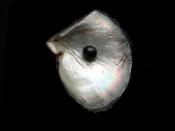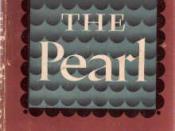John Steinbeck's The Pearl is a tale of a poor Indian family who stumbles upon the greatest pearl in the world. Headed by a man named Kino and his supporting wife Juana, they both are determined to live a wealthy life no matter what the cost. Although the story is fictional, it is based on the unpleasant truths of life as we know it. Steinbeck reveals an array of irony like no other: Starting with Kino finding the pearl of the world, the pearl buyers not to buy the magnificent pearl, and ending with the evil that the pearl brought upon the characters.
Kino and Juana woke on a gloomy morning after a tragic accident where their baby, Coyotito, was slashed by a deadly scorpion and left to die. With hope of being able to pay for medication, Kino and Juana coasted out to sea to rummage around for their prize.
Things were very uncertain on this dark and foggy day and their eyes were sure to be playing countless tricks on them. Even though Kino was an expert at his trade, pulling an ordinary clam into his canoe and prying it open to find the furthermost perfect pearl in the world was an incredibly ironic factor especially due to the misgivings of Mother Nature. "The great pearl, perfect as the moon" (19).
Kino went on a brief voyage to sell the pearl to the local pearl buyers to achieve his dreams of a better life for him and his family. When he got to the main part of town and met up with each pearl buyer he was shocked to hear that the pearl buyers were not as greatly awed by the pearl the same way everyone else was. At first Kino and Juana accepted what the pearl...


